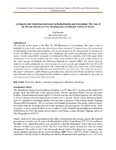| dc.description.abstract | The fulcrum of this paper is the May 22, 2017Manchester City bombing. The paper seeks to
highlight how the youth can become indoctrinated into extremism. It inquires into why some people
go through the terrorism indoctrination cycle yet not progress to the critical point of carrying out
terror acts.Whereas several scholars have challenged the whole radicalization discourse, their
basis is on the vulnerability of people to extremism in Western countries, which this paper finds
inadequate, as it does not address the root cause of the problem. The results of data analysis on
the terror groups al-Shabaab and Mombasa Republican Council (MRC) has shown that the
majority of youth joining the two terror groups do so at an early age ranging between 16 to 20
years of age and lack a good education. The Countering the Lone-Actor Terrorism (CLAT) project
results has shown a relationship between mental health and terror acts. The point of concern in
this paper is therefore, youth without a good education, who have first-hand exposure to violence
indoctrination and or with mental health problems would be easier to radicalize to the point of
carrying out acts of terrorism and extremism.
Key words: Terrorism, jihadist, extremism, depression, alienation, bombings. | en_US |

